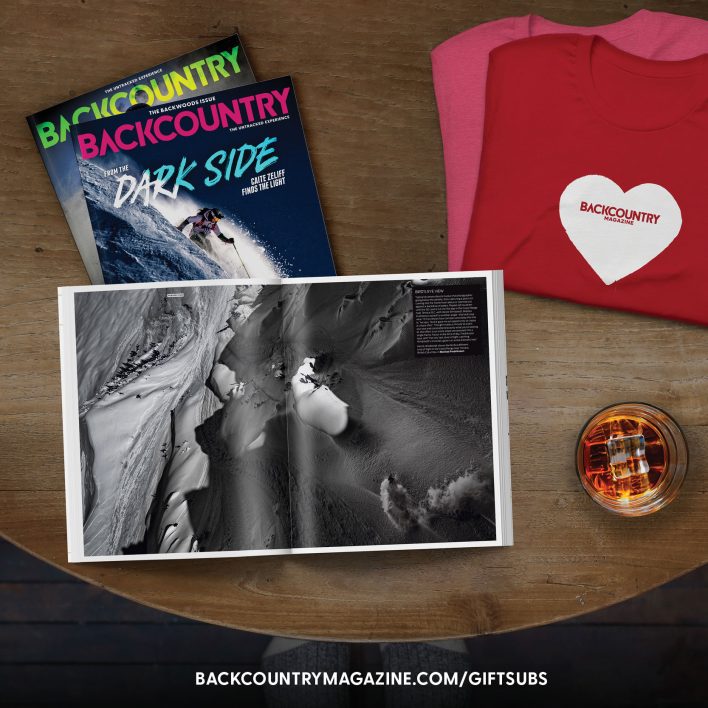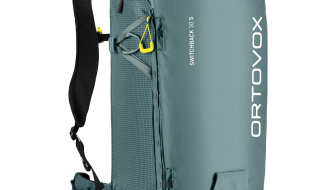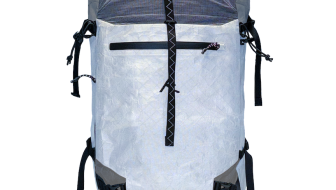You might not have heard the name Madison Rose Ostergren yet, but the key word there is yet. On the heels of starring in a Warren Miller film, signing with Völkl Skis and making the move from Salt Lake City, Utah, to Jackson, Wyoming, the bubbly 24-year-old recently released a short film, “Fuel,” with photographer Iz La Motte. The 5-minute video showcases not just Ostergren’s explosive skiing, but also Olympic skier Mark Engel’s musical talents and a voiceover from Ostergren detailing what drives her in the mountains. As a cherry on top of creating a great film with a great friend, the “Fuel” premiere on Tuesday, November 16, brought four hundred people to Salt Lake’s Lone Pine Gear Exchange—over ten times as many as Ostergren and La Motte had planned on hosting.
In between ski movie premieres, meeting up with old friends at the Killington World Cup and writing a few new songs, Ostergren made time to hop on the phone and answer a few questions.
Backcountry Magazine: What’s your history as a skier?
Madison Rose Ostergren: My background as a skier started when I was five years old. My parents bought me a pair of garage sale pointy-tipped skis. They were like, “This girl has so much energy. We need to keep her busy and occupied.” So I hopped on my first pair and grew up in a small little hill. It’s actually a town hill in Traverse City, Michigan. I got into racing because I was born competitive. I won a lot of participation ribbons in the beginning and then really fell in love with it and competitively raced my entire life until college. I had a coach that told my parents that in order to take it to the next level, I need you to go east or need you to go west. That’s when my family and I packed up and moved from Michigan to Salt Lake City, Utah. I raced for Westminster College in NCAA Division I there.
Being in the Wasatch in Salt Lake there are so many opportunities for backcountry skiing and powder skiing. I’ve always just loved skiing first, and that’s what it came down to. I love that I have a background in ski racing, but really, skiing for skiing is the most important thing to me, and being able to be outdoors and in the mountains with the people that I love. I transitioned into more big-mountain skiing and focused all of my energy on that.
BCM: How did you and Iz La Motte meet?
MRO: Iz and I met up at Alta four years ago or so. We immediately hit it off and were best friends from the get-go. I was like, “Ooh, I really like working with you,” and then we just became really, really tight and close friends. We go out and shoot photos together, but most importantly, we just operated similarly and had similar outlooks. We’re two females in the industry both trying to work with each other so that we can build each other up in the ski industry.
I love working with Iz. She’s the kind of person that it isn’t just a job, you know. There’s the work side of skiing, and there’s the fun kind of skiing, but with Iz, it’s both. She put her heart and soul into this project and into creating this vision that we had for two years. And we wanted to make something beautiful that we were really proud of. She put so much love and attention and energy and hard work into it. I couldn’t be more proud.
BCM: Within the movie, you have these voiceovers, and there’s definitely a message that’s being shared in this film. Do you want to speak to that a little bit?
MRO: The biggest message that we were trying to showcase was acceptance, and what I touched on in the short film is that from a young age, we are told there are certain ways to look, certain ways to be and act. Over the last two years, I’ve really started to find myself a lot more, and a lot of that had to do with slowing down and grieving and really diving inward. Looking at myself and being like, “What do I want to do? What’s my purpose?” I want to share a message that shows up for young females in the industry or young athletes, or, honestly, anyone. That allows someone to feel like they can just be themselves and not be judged.
For a long time, I didn’t do that. I tried to do what everyone wanted me to be. And I found myself feeling empty and not fulfilled. When I started to shift my mindset to accepting myself more, all of a sudden I found different kinds of people in my life that loved and supported that, and it felt really good. I think we’re not really taught that it’s OK to show up like that. There’s a certain, exact way we need to live our life. And that means how to have relationships with people and how to go to school and then go to college and have a job and then get married. When it comes down to it, just accepting who you are and accepting the people around you and loving that about a person and not expecting people to be a certain way.
BCM: On top of being a skier, you’re also a musician. How did music play a role in this film?
MRO: One of my best friends is named Mark Engel. He’s an Olympic ski racer. I’ve known him for a long time now, and we connected on a on a musical level. Music plays a huge role in my life, and two and a half years ago, I heard a song called “Foreplay” from Mark’s album. I don’t know how many years ago it was, but I heard that song and I was like, “That is the song that I want. I want this song, and I want to make a film with this song.” Long story short, we had this vision with the song.
Sponsors were saying, “What if you did an episode series? Maybe make it three parts and all this stuff.” I thought about it, and I almost let that happen. I almost let someone try to dictate what I wanted to do with this project and what isn’t. When it came down to it, I wanted this song to be the song. I would visualize every single night what I wanted, like how I wanted to put the video together with the song. Being able to use his music as an Olympic ski racer in the film I just thought was the coolest thing ever. I don’t know anyone that’s doing this right now, having their soundtrack from another skier.
Music has so much power. It can speak to you, and it can allow you to feel emotions. I love how the song starts slow, builds up, crests and then kind of slows down again and then ends with another crest. I wanted to use the music to tell the story as well.
I love playing music with Mark and my buddy Christian. We’re starting a band and it sounds funny because I’ve wanted that since I was five years old. I’m like, “I want to be a rock star, I want to be in a band.” And now it’s kind of coming true. So that feels really, really magical and special.
BCM: How did you write the end credit scene song?
MRO: I do a lot of freestyling, songwriting. Originally it took two tries. We tried recording improvisation and it was like, “OK, there’s some really good stuff in there.” I went back and jotted some notes down and was like, “Hopefully this goes with the tempo of how the credits are going to go.” Sure enough, I think we tried it three times, and I came up with it on the spot. Not much planning was involved. We just sent it. It ended up sitting quite pretty for me in the end. And we’re like, “Oh, sweet.” So, yeah, it was kind of on the spot; a little bit of planning that went into it, but mostly just brains working together and coming up with the end of the film.
BCM: What is it like to come of age as a skier in the social media era?
MRO: I’m in the age where social media plays a huge role in everyday life, which I have an interesting relationship with it. I treat it as a marketing tool, but I don’t like to spend that much time on it. When I was getting into the industry, I tried to use Instagram because it was one of the tools that I knew how to use. And I think that I don’t get too much pushback for social media because I try to keep things kind of light and happy. But I think that there has been some negativity, and some people that have categorized me as an Instagram skier, which felt hurtful because I was like, “No, I’m an athlete; I’ve been an athlete my whole life.”
Navigating that and hearing people be like, “Oh, she’s just an influencer or an Instagram skier,” I think part of that hurt a little bit. But then I really had to tell myself, “No, that’s not what I am. I’m an athlete, and this is the platform that I was given in my time of coming into the professional skiing industry.”










Related posts: